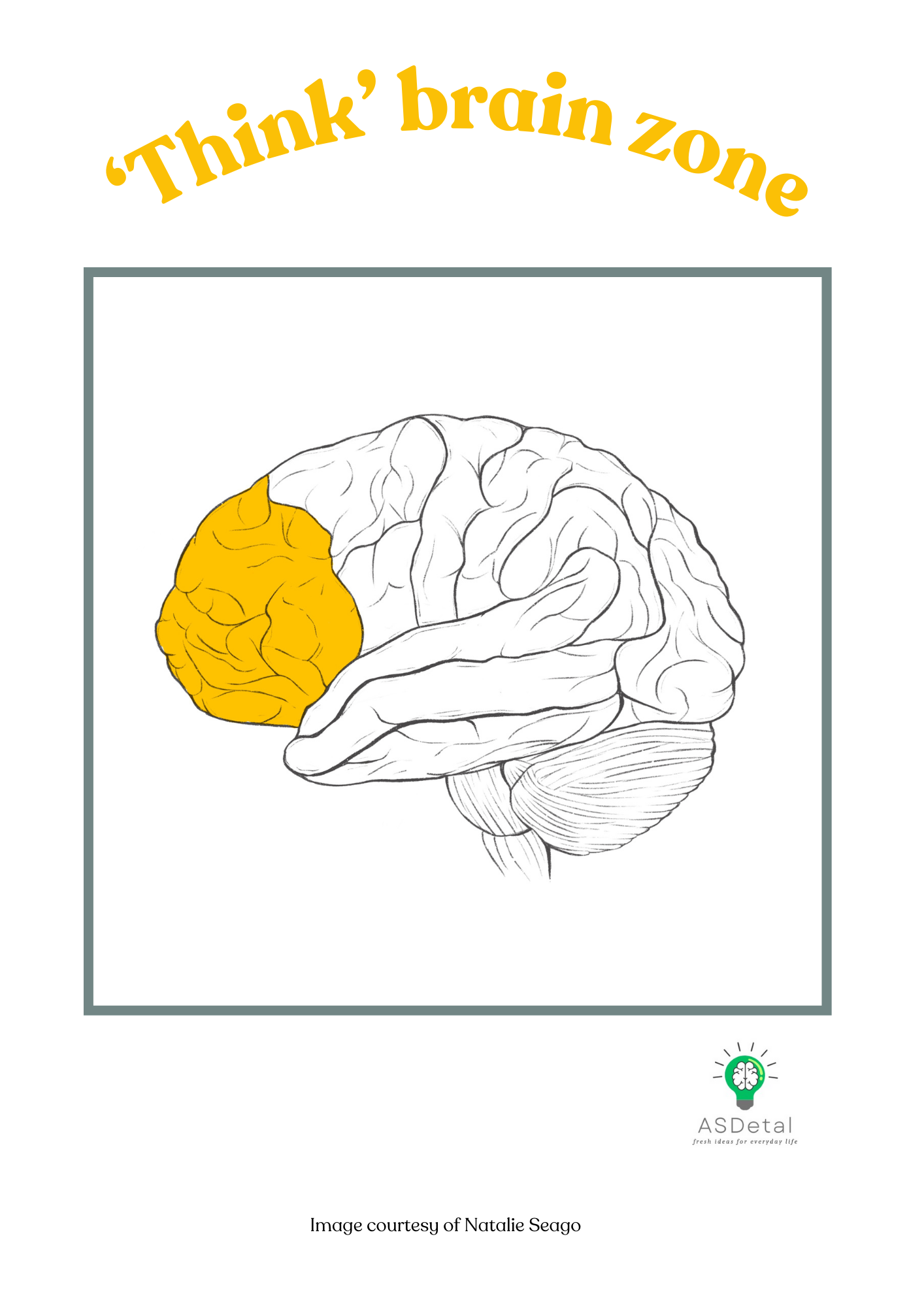What are Executive Functions?
'Executive Functions' are a group of brain skills which enable us to perform purposeful, goal-directed and problem-solving behaviour.
Examples of Executive Function skills include the ability to initiate behaviour (get started), inhibit competing actions or stimuli (not act impulsively), select relevant tasks or goals, plan, organise oneself and 'keeping going' (task completion), use problem-solving strategies flexibly when necessary, and monitor and evaluate our own behaviour. Difficulties with executive functions are often most noticeable in complex, novel, or new situations.
Another way to think of the Executive Functions is the 'control and command centre' of the brain; it acts rather like a conductor conducting an orchestra. The area of the brain which is mostly responsible for the Executive Functions is behind the forehead (the frontal lobe).
Executive Functions (EF) may also be viewed as ‘higher order’ thinking skills, as they require more complex cognitive control functions than language, memory, perceptual abilities etc.
Where do Executive Function Skills happen?
The region of the brain which carries out Executive Functions is situated behind the forehead, as shown in the illustration below.

I call this the 'thinking brain zone'. Importantly, EFs are a set of skills which develop through experience and practice. They are learnt, and do not develop automatically, or by 'osmosis' (absorbed like a sponge), as children mature. They are not strengthened by 'time out', sanctions, detentions, or nagging (parents who are aware of their children's EF struggles will recognise with this!).
Children don't necessarily outgrow the problems they have with these advanced thinking skills. In my professional experience, children with Autism, ADHD and other neuro-different brains nearly always have some challenges with one or more EFs. A number of my adult clients have experienced difficulties too.
If your child has difficulties, delays or deficits in their EF skills, it can have an impact on their learning. For example, if they have a very short attention span or are easily distracted. They may not be able to stay on task or lose control of their emotions. They are not being deliberately uncooperative or oppositional; they just haven't acquired the skills to allow them to do the right thing. In my opinion, being taught EF skills is as important as teaching a child how to write their name or sound out the letters in an unfamiliar word.
EFs are slow-to-develop skills. Foundations are laid in early infancy eg. self-soothing to sleep and paying attention to new or novel objects in the environment. The development of skills like attention, future-focused problem-solving ('What if.....?',) and self -regulation of emotion and behaviour continues throughout the childhood and teenage years. Some of these skills continue to mature and build into the mid-20's, or even later for some.

How do I know if my child has Executive Function skills issues?
Children and teens with Autism, ADHD, et al almost always have delays and challenges with their Executive Functions (EFs). The older they get the more evident these difficulties can become. Teens tend to keep using 'Mum or Dad's brain' for far longer than typically developing children.
Do you feel exhausted trying to keep on top of the demands of your own life as well as those of your child? EF skill issues may be the culprit!
Have a look at the next section to briefly learn about the key EFs.

The 12 Executive Function Skills
'In control' skills :
Before being able to engage with any task, the following three Executive Function skills are required:
Response inhibition (impulse control) – the capacity to think before you act – be able to resist the urge to say or do something, thus allowing time to evaluate the situation and how this behaviour might impact it. To apply a 'mental brake' and STOP.
It is no accident that this skill is at the top of the list, as it can be particularly problematic, for you, your child, and others, when it is not fully developed by the expected age.
If this is an area of concern for you, check out the Strengths and Challenges Checklist for Response Inhibition which can be purchased for a low cost and added to your child's Skillset Portfolio.
Emotion Management (emotional control) – a narrow definition could be : 'the ability to manage emotions to achieve goals, complete tasks, or control and direct behaviour'. But I have a broader understanding of this skill. Rather, I think it is about being able live in a calm, contented state most of the time. Finding the optimum emotional well-being, 'in-balance', or 'just right', state (also known as eustasis).
When a child doesn't have the mind and body skills to maintain a calm and contented emotional state, they often become highly reactive. Parents have described this like 'a switch being pressed'. The child also becomes dysregulated. 'Emotional dysregulation' is the response we see when these skills are poorly developed. This can sometimes be an extreme and frightening reaction for loved ones.
If you are worried about your child's emotion management difficulties, download a copy of the Strengths and Challenges Checklist for Emotion Management to get to grips with the problem.
Flexibility – a typical definition would be : 'the ability to revise and change plans in the face of obstacles, setbacks, new information, or mistakes. To adapt to changing conditions' and this skill is often linked with 'keeping going' EF skills (see later in the text).
My professional observations have been that mental rigidity (or a lack of flexibility) means it can be very hard for the child to 'switch focus', or change their train of thought, and so they become 'stuck'. This reduced mental agility can have a significant impact on their ability to feel 'in control' of themselves. More on this later.
'Getting Started' skills:
If your child's 'in control' skills are reasonable, they will need the following three key Executive Functions to get started on any task :
Task initiation – the ability to begin projects without undue procrastination, in an efficient or timely fashion.
Planning / prioritisation – the ability to create a road map to reach a goal or complete a task. It also involves being able to make decisions about what is important to focus in and what is not important.
Organisation – the ability to create and maintain systems to keep track of information or materials.
'Doing' skills:
To perform or 'do' a task or activity, three further Executive Functions are needed:
Sustained attention (focus) – the capacity to keep paying attention to a situation or task in spite of distractibility, fatigue, or boredom.
Working memory – the ability to hold information in memory while performing complex tasks. It incorporates the ability to draw on past learning or experience to apply to the situation at hand or to project into the future.
Time management – the capacity to estimate how much time one has, how to allocate it, and how to stay within time limits and deadlines. It also involves a sense that time is important.
'Keeping going' skills :
In order to 'keep going to the end', so as to finish a task or activity, the main Executive Function skills required are:
Goal directed persistence – the capacity to have a goal, follow through to the completion of that goal and not be put off or distracted by competing interests.
Problem-solving - being able to come up with different ways to complete a task if the one held 'in mind' isn't working. (What's our 'Plan B'?)
'Putting it all together' skill:
Best seen as an over-arching Executive Function skill:
Metacognition – the ability to stand back and take a bird’s-eye view of yourself in a situation, to observe how you problem-solve. It also includes self-monitoring and self-evaluative skills, for example, asking yourself ‘how am I doing?’, or ‘how did I do?’
This is a vital skill to develop to support 'in control' skills.

Simple strategies to support the development of executive functions
The strategies below can help to build EFs in general terms. It is often preferable, however, to target the individual skills which are most relevant to your child's strengths, challenges, and age. I will write more about this in the coming months, so do keep checking back.
· Provide structure and guidelines
· Provide clear expectations
· Use Coping Cards for addressing self-regulation needs
· Break down the task and work on one step at a time
· Work on one aspect of a bigger issue (eg. crossing the road without looking)
· Teach your child to 'Stop and Think'. Playing the "freeze" game, for example, can help with this.
· Talk about what worked and what didn't work without judgement. Learning self-reflection is very important.
· Provide rewards for successful use of strategies or behaviours
· Practice mentally "shifting gears" to transition between tasks
· Demonstration / modelling. Play role-play or imagination games using strategies the child can carryover
· Use specific rules
· Provide opportunities for guided practice with feedback
· Instruction and definitions of appropriate behaviour
· Add changes to routines gradually
· Use cues for stopping and changing activities (physical or verbal prompts as appropriate)
· Use illustrations with examples
· Provide clear expectations
· Try a checklist
· Rehearse activities, talking through the process
· Act out activities
· Reduce clutter
· Provide color-coded organization tools
Thanks go to Natalie Seago for the brain illustrations.